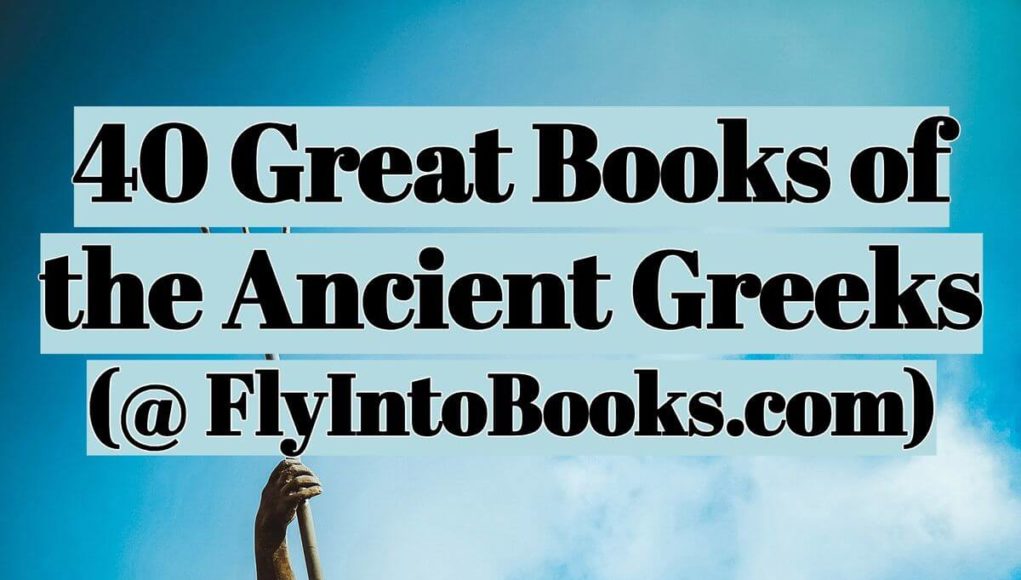Get Ready to Go on a Cultural Journey:
Join Our Newsletter and Discover Fascinating Destinations and Literary Adventures That Will Ignite Your Imagination!
Affiliate Disclosure: As an Amazon Associate, I earn from qualifying purchases. If you choose to purchase after clicking a link, I may receive a commission at no extra cost to you.
Great Books of the Westen World –
The Ancient Greeks
Here at FlyIntoBooks.com, we are on a quest to read the Great Books of the Western World. We have already started our journey, but we thought “how can we make this easier?” Because the Great Books of the Western World are books that come from history, it’s good to look at history and see why these books were written and in what context they were written. Let’s start with the Ancient Greeks!
The point is this: we read the Great Books of the Western World in order to learn about history and to understand our current world. But we can also study history in order to learn about these Great Books too.
So, for our first list (Year 1 – The Great Books of the Ancient Greeks), we can study some history in order to understand the context in which these books were written.
To learn about the historical context of the Ancient Greeks, and the books that were written in that time we can look at many good video courses. For example Kahn Academy’s newly minted “World History – 2nd Wave civilizations” videos.
Kahn Academy’s World History –
2nd Wave Civilizations:
1. Ancient Persia
- Ancient Persia
- Cyrus the Great and the Achaemenid Empire
- The Rise of Persia
- Zoroastrianism
2. Classical Greece
- Classical Greece
- The Greek Polis
- Greco Persian Wars
- Second Persian Invasion
- Classical Greek Society and Culture
- Philosophy: Socrates, Plato, Aristotle
- Prelude to the Peloponnesian War
- The Peloponnesian War
3. The Rise and Fall of Empires
- Comparison: the Rise of Empires
- Comparison: the Fall of Empires
- Comparing the rise and fall of empires
4. Empire of Alexander the Great
- Phillip of Macedon unifies Greece
- Alexander the Great takes power
- Alexander the Great conquers Persia
- Diadochi and the Hellenistic Period
- Alexander the Great
Takeaways from History for the Great Books of the Western World
Looking at the videos above, we can see the context in which the Ancient Greeks wrote their books. The same books we are reading in the Great Books of the Western World come from this historical context.
For example, the book Histories written by Herodotus (which is on our list of Great Books of the Western World to read) is about the origins of the Greco-Persian Wars. As seen in the Kahn Academy videos above, we see that the Greco-Persian Wars occurred because the Hellensitic (i.e. Greek) regions of the Ionian Penisula had revolted against the Achaemenid Empire of Persia.
But wait… What are the Hellensitic regions of the Ionian Penisula?
And what was the Achaemined Empire of Persia?
That’s the point.
If you watch the Kahn Academy videos on that subject, then you will gain the background knowledge to understand the book Historiesby Herodotus. Reading comprehension doesn’t merely come from reading the words on the page, but in fact also comes from our background knowledge of the subject. Researchers have also thought that activating and improving a reader’s background knowledge before reading a book is a more effective way of improving reading comprehension. More so than improving a reader’s ability to decode the words on the page.
But what about all the other guy’s on the list? (yeah… they are mostly guys. But you can also read some great books by women authors too!)
It’s true that not all the books written by Ancient Greeks on the Great Books of the Western World list are history books. In fact there are also tragedies, philosophy, and even maths books too on the list.
So, we need a more useful categorisation of the books on the list in order to improve our background knowledge of the subjects we are about the delve into.
The Great Books of the Western World –
a more useful list for the Ancient Greeks
So, let’s break down the list of Ancient Greek authors into more useful categories. If we read about and watch videos about those categories and the authors within them, then we can have a more enjoyable time reading the Great Books of the Western World. I mean is gonna take over 4 years to finish all the books, so we need to enjoy the process!


We can divide the list of Anicent Greek authors into 7 different categories: 1) Homeric Epics, 2) Greek Tradegies, 3) Histories, 4) Biographies, 5) Philosophy, 6) Medicine, 7) Maths.
Here’s a few pointers on each of them:
1. Homeric Epics:
Author: Homer
Books: The Illiad, the Odyssey
Here we have Homer and his two epics of The Illiad and The Odyssey.
These two texts are the centre of Ancient Greek Literature, and have such a strong prescence in later Western Civilization (read: Virgil’s Aenied, and Jame Joyce’s Ulysses).
2. Ancient Greek Tragedies:
Authors:
a. Aeschylus:
– Prometheus Bound,
– The Oresteia (Agamemnon, Libation Bearers, Eumenides)
b. Sophocles:
– The Theban plays (Oedipus Rex, Oedipus at Colonus, Antigone)
c. Euripedes:
– Alcestis
– High tradegy: Medea, and Hippolytus
– Disillusionment at the senselessness of war: Trojan Women
– Tragic despiar: The Bacchae
Here, we have the masters of the ancient greek tragedies. Aeschylus codified and established the rules of tragedy. Sophocles reformed the rules of tragedy by introducing a third actor, scenary and the use of scenes (among others). Euripedes further experimented with the conventions of tradegy and focused more on the internal conflict and feelings of the characters.
3. Histories:
Authors:
a. Herodotus – Histories
b. Thucydides – The Peloponnesian War
Here we have the master historians of the Ancient Greeks. As described above, Herodotus’ Histories talks about the beginnings and causes of the Greco-Persian Wars (499 – 449BC). In contrast, Thucydides’ The Peloponnesian War talks about the Peloponnesian War (431 – 404BC) between Athens and Sparta which Athens lost.
4. Biographies:
Authors: Plutarch
Lives: Lycurgus, Solon, Pericles, Alcibiades, Aristides, Alexander
Here we have Plutarch’s Lives of the Noble Greeks and Romans – a series of biographies (not really neutral though) of ancient Greeks and Romans. In the book, Plutarch compares and contrasts one person from Greek culture and one person from Roman culture. However, in our Great Books of the Western World list, we have only a couple of the Greek lives in order to understand the Ancient Greeks. However, it might also be worthwhile to read the Greek and Roman lives together to see how Plutarch compared the two.
5. Philosophy:
Authors:
a. Plato: Ion, Meno, Gorgias, Republic, Symposium, Apology, Euthyphro, Citro, Phaedo
b. Aristotle: Poetics, On the Heavens, On the Soul, Ethics, Metaphysics
Here we have the masters of Ancient Greek philosophy. Of course, you’ve heard of them before but probably have no idea what they wrote in their original books. They seem complicated and boring, but just wait till we get them and start to gradually build up our knowledge of Plato and Aristotle and each of their books. Some of their books actually talk about the Tradegies, the Histories, and other periods we will study in advance too so it’ll help as we gradually build up our background knowledge.
Slow and steady wins the race!
6. Medicine:
Authors: Hippocrates
Books: The Oath; On Ancient Medicine; On Airs, Waters, Places.
Here we have the father of medicine in the Western tradition. There are still lots of ideas that started with Hippocrates and have come down until our time today. For example, Hippocrates’ The Oath talks of the Hippocratic Oath which modern doctors still need to take before they start practising medicine (albeit changed a bit).
7. Maths:
Authors: Euclid
Book: Elements
Euclid’s Elements is a mathematical treatise consisting of 13 books that deals with geometry and number theory as well as their proofs. It is such a remarkable book because when the quadrivium was included in the curriculum of all unviersity students, Euclid’s Elements or part of it was required reading. It is also the oldest, large-scale deductive treatment of mathematics, and was key in the development of logic and modern science.
These kind of mathematical/science books are also probably a little dad boring, because it’s just full of math. But it would be useful to have a skim through it to understand what the Ancient Greeks knew so long ago and how much of our own mathematics curriculum is derived from their knowledge.
So, Now What?
Let’s Read the Great Books of the Western World!
So, how did we do? Did we give you new energy in how to read the Great Books of the Western World?
We hope that our new framework is a way for you to delve deeper into not just reading the words of the Great Books of the Western World, but also attempting to understand the culture, background and reasons why they are so important to our world today.
Like we said before, reading is not just about reading the words on the page. It’s about improving our knowledge and learning more about our world – not just our present-day world, but the reasons why it has become the way it has.
By reading and learning more about the Great Books of the Western World, we can attempt to understand why they are considered the Greak Books. We can also try to see how they impacted and influenced history to bring us into the current world.
Whew… all done!
What should we write about next?
Let us know in the comment box below!
Or Contact Me here.
Cheers,
A.J. McMahon
.
.
.
Let’s Connect!
– Instagram: AussieAndyEnglish
– Pinterest: FlyIntoBooks
– Facebook: FlyIntoBooks
– Twitter: @FlyIntoBooks
– GoodReads: A.J. McMahon
Affiliate Disclosure: As an Amazon Associate, I earn from qualifying purchases. If you choose to purchase after clicking a link, I may receive a commission at no extra cost to you.
Get Ready to Go on a Cultural Journey:
Join Our Newsletter and Discover Fascinating Destinations and Literary Adventures That Will Ignite Your Imagination!















